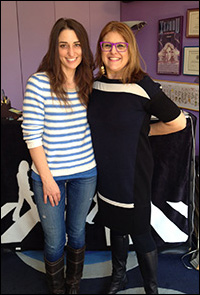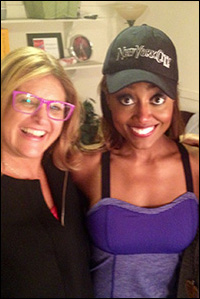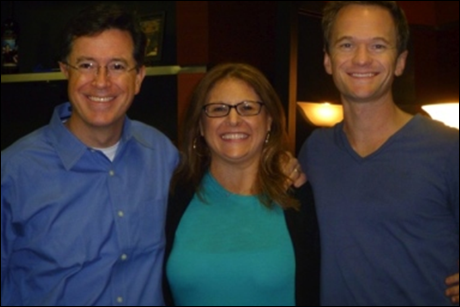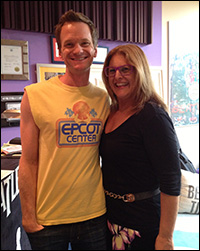
During the June 8 Tony Awards ceremony at Radio City Music Hall, Harris (Hedwig and the Angry Inch) and Iglehart (Aladdin) both took a moment during their acceptance speeches to thank veteran Broadway vocal coach Caplan for keeping them in top vocal health. Caplan's vocal essentials, which help the stars maintain their voices eight performances a week, has also led numerous artists to the podium on Tony Awards night.
*
Caplan has been a vocal coach in New York City for over 30 years and lectures around the world. She is the vocal supervisor of the Broadway and touring productions of the Tony-winning musicals Once and The Book of Mormon, as well as American Idiot, Rock of Ages and Jason Robert Brown's 13. She is also the vocal consultant on such productions as Motown the Musical, Disney's Aladdin, The Last Goodbye, In the Heights and Next to Normal, as well as the "White House Salute to Burt Bacharach." This season she serves as the vocal supervisor on Hedwig and the Angry Inch starring Neil Patrick Harris.
Her students range from Tony Award-winning Broadway actors Nikki M. James (Book of Mormon), Steve Kazee (Once) and Patina Miller (Pippin), to stars of the recording industry, including Sara Bareilles, James Blunt, Natasha Bedingfield, Eric Hutchinson, Empire of the Sun, Lily Allen, The Goo Goo Dolls, The Darkness, among others.
Caplan provided coaching on camera and played piano for Carey Mulligan in the 2011 Steve McQueen film "Shame"; and was vocal coach for the Golden Globe-winning film adaptation of Les Misérables, in support of Amanda Seyfried and others. She is also the vocal coach for Stephen Colbert of the "Colbert Report." A frequent commentator for CNN and Reuters, her affiliations include The American Federation of Television and Radio Artists, The Drama League, and National Association of Teachers of Singing, where she has been a speaker, panelist and workshop facilitator. She is also on the faculty of the Voice Foundation in Philadelphia and is a member of the New York Singing Teachers' Association, as well as a member of the Voice and Speech Therapists Association.
When you find yourself getting sick, or in danger of losing your voice - and still have to audition or perform - what are the best ways to prepare and to take care of your voice?
Caplan: As long as one stays on top of one's immune system (ability to get through typical bugs quickly by maintaining good health), there are many remedies and witchy brews that I recommend to my students for quick health boosts: immediate large doses of Ester-C (the body depletes of this immune support supplement when under the weather) in combination with Zinc, oregano (supplements or oil on tongue), ginger tea, echinacea/goldenseal tea or drops, as well as garlic (nature's antibiotic).
Besides these immune boosting supplements and remedies, one can vocalize slowly and gently in order to get muscles supple. If the sinuses are congested, I have specific vocal exercises that bulldoze through them in order to feel oxygen moving through the sinus passages. This is to ensure the singer does not succumb to using compensatory muscles (which create excess laryngeal pressure) in lieu of nasal resonance.
It's important to keep the sinuses and throat moisturized. I recommend having either Ayr or Ocean Saline mists standing by for sinuses and Entertainer's Secret Throat Relief for the larynx. These sprays (homeopathic and over the counter) will also keep any bacteria from getting deeper into the upper respiratory cavities.
| |
 |
|
| Sara Bareilles and Liz Caplan | ||
Caplan: The short answer is actors/singers should develop all parts of their voice. Gone, unfortunately, are the days of music school rules of only working within your tessitura (Italian for "texture"). The tessitura is where you can sing for the longest amount of time without fatiguing. If one wants a versatile career with longevity, the actor must work all registers of his or her voice. From one audition to the next, from one production to the next, the human voice will be challenged depending on the character one gets bestowed.
Singing every note one is capable of vocalizing goes against every tenet of "old school" training. When voice majors leave university training having only worked within their tessitura, they will find themselves challenged when asked to sing in a different register with an unfamiliar timbre. This becomes problematic when the singer tries to push to compensate for lack of muscle support in untrained areas of the voice. Vocal damage could ensue.
I have always liked to work the voice's middle registers first in order to strengthen the part of the voice that people often refer to as the "hole" in their instrument. This hole happens when you bear down too heavily in an unfamiliar and untrained register. One ends up with a lower register that's super beefy, an upper register that sounds somewhat breathy, and then a non-existent middle register. Once the middle voice has some suppleness, strength and volume, it becomes easier to distribute that same timbre below and above the middle. Because there is finally balance amongst the registers, belting per se might never be necessary. And don't we all desire a seamless instrument?
What are some common mistakes you see performers make that can strain or damage the voice?
Caplan: The first common mistake is not warming up. This is where I get old-school myself. I believe that warming up helps prepare the actor for any variables that might rear themselves at an audition, rehearsal and performance. Examples of such variables are weather and temperature, allergies (dust and mold are detriments for singers), amount of sleep, nutrition, hydration, respiratory health, adrenal health, muscular skeletal alignment, energy and mood. If one warms up, you at least have a sense of the sound you are capable of making on a given day. This removes the element of surprise.
Training the voice and keeping it healthy is much like training for the Olympics. One must train constantly, and not just last minute. I think at one time or another we have taken a short cut and "crammed" vocalizing in when you haven't been on top of doing so. You realize quickly how the muscles are smarter than you, and are not so willing to perform on command. So ongoing vocal work is so much more fulfilling when the part for which you are perfect finally comes around and you are prepared. Other common mistakes are realizing that food allergies, alcohol and smoking might not agree with your voice and help your cause. I'm not trying to be a stick in the mud, but if your voice does not respond after a night of wine with friends or sitting around a hookah, you might want to time those magic moments more thoughtfully. I can truly state with certainty that the people with whom I work who have reached performance milestones (Tony Awards, Grammy Awards) are generally quite disciplined about what chemical, no matter how organic, enters their bodies when they have auditions and production schedules ahead of them.
Other musical mistakes would be singing the wrong piece of music for your voice and type. Imagine yourself being on the other side of the table. What would you want to hear yourself sing based on your vocal capabilities and physical type? Being realistic about what's in your wheelhouse is important. You want to come to an audition ready to inhabit a character with solid choices, tell a story and be your most-relaxed self. We all truly want you to have a positive experience.
| |
 |
|
| Liz Caplan and Patina Miller | ||
Caplan: Listening to all genres of music is so important. Traditional music theatre productions will always be around. They represent the infrastructure/cellular makeup of our musical education. But with the record industry existing only peripherally today, signing only tremendously money-making acts, Broadway is being pleasantly infiltrated with rock and pop writers whom we've grown up listening to, as well as writers on the charts right now. It's our job as teachers, coaches, performers to be aware of all sonic brands. Then we must make sure our instruments can handle the vocal demands being put on our muscles.
I would teach significantly different exercises for rock and pop shows to help the vocal muscles meet the demands than I would for traditional musicals. The larynx will be lower but flexible in the anchored position for rock and pop material. The breath has to be grounded and the base of the tongue has to be tamed. Liz Caplan Vocal Studios have apps that have specific exercises for all vocal genres and addresses issues that might come up on a regular basis.
Contemporary musical theatre is full of rangy power ballads. When auditioning for a piece that asks to show your range, where is the line between finding a song that is rangy, yet appropriate?
Caplan: I would always suggest that a student sing a song that sits best in their voice at that moment in time. What would be the use of challenging yourself in the middle of an audition? You want to feel polished and certain of what your voice and emotional center can produce. If you are the absolute perfect person for the show for which you are auditioning, keys can always be adjusted. The Actor's only responsibility is to show up at an audition prepared physically, mentally, emotionally and vocally.
How do you feel about riffing/vocal embellishments during an audition? Is it more impressive to show off your vocal tricks or your control/simplicity?
Caplan: I believe that simplicity is always best. Let the casting director hear who you really are in a stripped down "unplugged" performance. If the singer/actor has a clear emotional connection to the song and a riff or vocal embellishment is going to enhance the emotion, but not take away from the core piece and it's done with vocal dexterity, then riff away. Embellishments should be used only because you have more to say emotionally and have to let it go. However, if one is singing a Sondheim or Jason Robert Brown piece, I would highly recommend sticking to the score as indicated. There are composers who take offense to people re-interpreting their score. If they wanted more notes, they would have written more notes.
 |
| Stephen Colbert, Liz Caplan and Neil Patrick Harris |
Caplan: If vocal technique has been ongoing, then it becomes easier to concentrate on the story telling. I truly do believe that the story telling is most important. But, if vocal health is in question, it will get in the way of telling said story, so the two need to meet and work together harmoniously. Your voice is your poetry, how you best express yourself. We feel your voice before we hear it. So the story is being told with your instrument and your command of it.
There are exceptions here. I find that when coaching a student on a song and we hit a wall, I have them speak the lyrics, find out what they mean in this moment. We discuss why the composer might have put these words with this melody and then discover how we can make it the students' own; it does usually mitigate the initial vocal crisis. The way to work is what is best with that particular student in that particular moment.
How do you advise singers on finding new material for his/her book? Where should they begin?
Caplan: The building of a book should be a realistic view of the singers' capabilities to date. It should contain music of all genres. Today this means Motown songs, Sting songs, Sara Bareilles songs, Alannis Morrisette songs, Sondheim, Jason Robert Brown, Stephen Schwartz, traditional music theatre pieces from all eras, standards; and inside of all of the above, the most riveting songs that you absolutely love to sing (in the right key) because that will resonate so deeply and clearly for whomever you are auditioning. It's best to be over prepared with music of all genres (ballads, uptempos and comic pieces), as you never know what production might be on the horizon.
Songs should be chosen because you feel as though you had written them yourself. The lyrics should feel like you'd speak them. The songs that get people work are the ones that they can inhabit fully with their spirit and their personality.
Speaking of a performer's book, how wide-ranging should a singer go? Is it preferred to have a bigger or smaller selection of songs?
Caplan: I think it's better to not offer a large selection of music for a single audition. It's too overwhelming for both the actor and the casting director. An actor can have a large main book with all their music alphabetically organized, or in some cases, organized by style, uptempo, ballad, etc. It's advisable to carry a smaller book for each specific audition. Contained in the audition book should be a maximum of three to four pieces appropriate for this particular audition. You choose the first one. If you are so lucky to have piqued more interest from the room, the casting director might ask what else you might have for them. That's when you can offer up your other selections. They can decide what they might need to hear to complete their idea of what they think/hope you can do. Do you find certain songs to be overdone? If so, are they still okay to use in your audition if you sing and perform them well?
Caplan: I'm in a position now as teacher and coach where the calibre of students with whom I'm lucky to work usually get material from the shows for which they are auditioning. The "too done" songs have not been a week to week concern of mine. But my opinion has always been that if you know a song is overdone, in that you've heard it outside audition doors a great deal, avoid it. There are massive amounts of material available. You could certainly find an alternate piece that might even say more than your original choice and elevate your audition experience.
| |
 |
|
| Neil Patrick Harris and Liz Caplan | ||
Caplan: A solid regimen is so important for the individual. My questions for my students on a daily basis are:
How are you feeling?
Have you been eating well? A decent amount of protein?
How have you been sleeping?
What's going on with your muscles? Any strain in your head or neck from working out?
How has your digestion been?
Are you moving your bowels regularly? (Believe it or not, constipation has blocked/prevented many a high note from freely coming out)
Then one must find what combination of all of the above works for them. Diet, exercise, sleep, hydration are all important factors in staying at the top of your game. I suggest that you find an Ear, Nose and Throat doctor who can support you when you need help. I have my favorites in New York, but most actors ask their closest friends whom they trust.
Part of this business is networking and socializing. How does one maintain proper vocal health, while out and about? Any tips?
Caplan: I do realize that being social is a big part of networking in order to make one's connections in the business. But vocal health has to take precedence over the great party or bar you were invited to - especially the night before a big audition. I'm a firm believer in moderation. If you find you have to show up somewhere (that is going to be loud) for political reasons, then make an appearance. Make sure you are breathing deeply. Loud restaurants and bars tend to make our ears accumulate more wax simply from the noise decibels. As a result, we tend to push down on our larynx and vocal cords to a potentially dangerous degree. And head and neck muscles lock up from loud noise or pressure in a room.
Say something important, stay for 45 minutes max, and then go home, drink hot tea, take a bath, bring your energy back to center. Do some gentle neck rolls and don't forget to breathe. A state of chaos does not generally support a successful career in any aspect of show business. How often should a performer attend voice lessons? What do you recommend for performers on a tight budget?
Caplan: Depending upon finances, immediate tasks at hand, and how quickly an actor wants to move forward, I recommend lessons once a week. Lessons can be recorded so easily now that once you take one lesson, you can repeat it every single day. If finances are an issue at the moment (I am always hopeful that this status will not be permanent), you can study as often as you are able. If that's twice a month, once every three weeks - as long as you are working with a teacher/coach whose language gels with your own understanding – you will still have an opportunity to excel. Again, my studios have apps in the Apple store that contain wonderful information on vocal health as well as vocal exercises for all genres.
You can also ask if the teacher of your choice, if [they are] too cost prohibitive, has associates or people who teach the same technique. I have associates who are licensed to teach my technique. They are highly trained by me and can offer lessons at a more affordable rate. This is generally done by referral.
The relationship with your voice teacher/coach is sacred. Singing is so personal, so exposed. It's important to feel a sense of trust, both with your voice and your personage with your chosen teacher. You want to find a teacher who has excellent qualifications and an equally stellar reputation. Always ask around the community.
If an actor is fortunate enough to find a great teacher/mentor early in his or her career, the rewards are fruitful and so fulfilling. I've had the pleasure of nurturing careers for decades. It continues to be a thrill when a student gets a callback, books a job and ultimately wins a Tony Award.
Take care of yourselves. Take it seriously. Be sure to enjoy the process.
I will look forward to hearing about your callback, you nailing the audition and your Tony Award!
*
This feature originally ran in February 2014 on Playbill.com.
*
Learn more about Liz Caplan at Lizcaplanvocalstudios.com.
(Adam Hetrick is the editor in chief of Playbill.com. His work appears in the news, feature and video sections of Playbill.com, as well as in the pages of Playbill magazine. Follow him on Twitter @PlaybillAdamH).









